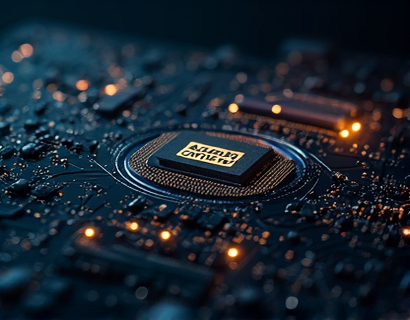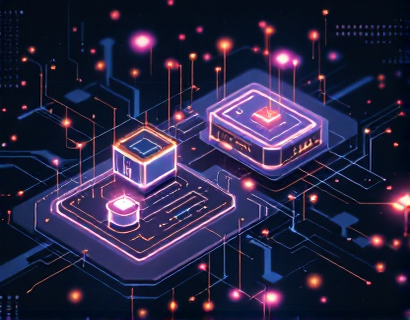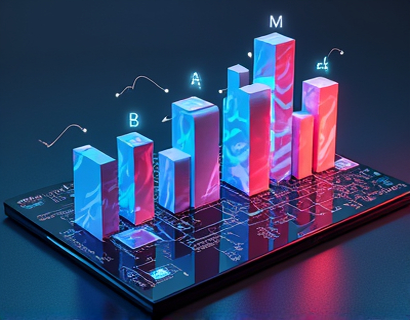Blockchain Oracle Management: Empowering Developers and Businesses with Advanced Solutions
In the rapidly evolving landscape of blockchain technology, oracle management stands out as a critical component for developers and businesses aiming to harness the full potential of decentralized applications. This article delves into the latest software solutions that are revolutionizing oracle management, focusing on how these advancements streamline data integration and enhance smart contract capabilities. By providing a comprehensive guide, this piece aims to equip readers with the knowledge necessary to unlock blockchain technology's full potential through efficient oracle management and seamless service access.
Understanding Oracle Management in Blockchain
Oracle management in blockchain refers to the process of integrating external data sources with smart contracts on a blockchain network. Oracles act as bridges between the blockchain and the outside world, feeding real-time data into smart contracts and executing actions based on that data. This integration is vital for creating functional and reliable decentralized applications (dApps) that can interact with real-world data and systems.
The challenge lies in ensuring that this data is accurate, timely, and secure. Traditional oracle solutions often suffer from issues such as data latency, single points of failure, and lack of transparency. These challenges can undermine the trust and reliability of blockchain-based systems, making advanced oracle management solutions essential for modern blockchain applications.
Key Challenges in Oracle Management
- Data Accuracy: Ensuring that the data fed into smart contracts is accurate and up-to-date is crucial. Inaccurate data can lead to incorrect contract executions and potential losses.
- Latency: Delays in data retrieval can hinder the real-time capabilities of dApps, making them less useful for time-sensitive applications.
- Security: Oracles are potential attack vectors for malicious actors. Ensuring the security of data transmission and contract execution is paramount.
- Decentralization: Relying on a single oracle or a small group of oracles can create vulnerabilities. A decentralized approach is necessary to enhance trust and reliability.
- Interoperability: Different blockchain platforms and smart contract languages require oracles that can seamlessly integrate across various ecosystems.
Advanced Software Solutions for Oracle Management
To address these challenges, innovative software solutions have emerged, offering advanced features and capabilities for oracle management. These platforms focus on enhancing data integration, reducing latency, and ensuring robust security and decentralization.
One such solution is the implementation of decentralized oracle networks. These networks aggregate data from multiple independent sources, ensuring that the information fed into smart contracts is not only accurate but also resilient to manipulation. By leveraging blockchain's inherent properties, these networks provide a transparent and tamper-proof mechanism for data sourcing.
Another key feature is the use of machine learning and predictive analytics to enhance data accuracy and reduce latency. These technologies can predict and pre-fetch data, ensuring that smart contracts have access to the most current information without significant delays. Additionally, advanced cryptographic techniques and multi-signature wallets enhance the security of data transactions and contract executions.
Decentralized Oracle Networks
Decentralized oracle networks are a game-changer in oracle management. These networks consist of multiple nodes, each contributing data to the overall feed. This decentralization mitigates the risk of single points of failure and reduces the likelihood of data tampering. Each node operates independently, and the network uses consensus mechanisms to validate and aggregate data.
For instance, a decentralized oracle network might include nodes that pull data from various APIs, IoT devices, and other external sources. These nodes are incentivized through token rewards for providing accurate and timely data. The network's smart contract ensures that only validated data is used, maintaining the integrity of the blockchain application.
Real-Time Data Integration
Real-time data integration is crucial for applications that require up-to-the-minute information, such as financial trading platforms, supply chain management, and IoT-driven dApps. Advanced oracle management solutions offer real-time data feeds by continuously monitoring and updating the data sources.
To achieve this, these solutions employ a combination of webhooks, streaming APIs, and event-driven architectures. Webhooks allow for immediate notifications when new data is available, while streaming APIs provide a continuous flow of data. Event-driven architectures ensure that smart contracts react to specific events in real time, enhancing the responsiveness and utility of dApps.
Enhanced Security Measures
Security is a top priority in oracle management. Advanced solutions implement multi-layered security protocols to protect data and contract executions. These include:
- Cryptographic Hashing: Ensuring data integrity through hash functions that detect any alterations in the data.
- Multi-Signature Wallets: Requiring multiple approvals for critical transactions to prevent unauthorized access.
- Zero-Knowledge Proofs: Allowing data verification without revealing sensitive information, enhancing privacy and security.
- Regular Audits: Conducting thorough security audits to identify and mitigate potential vulnerabilities.
These measures not only protect against external threats but also build trust among users and developers, ensuring that the oracle management solution is reliable and secure.
Interoperability and Cross-Chain Support
Interoperability is another critical aspect of advanced oracle management solutions. As the blockchain ecosystem grows, the need for solutions that can seamlessly integrate across different platforms and protocols becomes increasingly important. Cross-chain oracles enable data and value transfer between distinct blockchain networks, fostering a more interconnected and efficient ecosystem.
These solutions use bridge protocols and atomic swaps to facilitate interoperability. For example, an oracle on Blockchain A can fetch data and trigger actions on Blockchain B without the need for intermediaries. This not only enhances the functionality of dApps but also opens up new possibilities for decentralized finance (DeFi), governance, and other blockchain applications.
Benefits of Advanced Oracle Management Solutions
The adoption of advanced oracle management solutions brings numerous benefits to developers and businesses:
- Improved Data Quality: Accurate and real-time data ensures that smart contracts function as intended, reducing the risk of errors and failures.
- Enhanced Security: Robust security measures protect against data breaches and contract manipulations, building user trust.
- Increased Reliability: Decentralized and redundant systems minimize downtime and ensure consistent performance.
- Greater Flexibility: Support for multiple data sources and blockchain platforms allows for more versatile and scalable applications.
- Cost Efficiency: By reducing latency and eliminating single points of failure, these solutions can lower operational costs.
Case Studies and Real-World Applications
To illustrate the practical applications and benefits of advanced oracle management, consider the following case studies:
Case Study 1: Decentralized Finance (DeFi)
A DeFi platform leverages an advanced oracle network to fetch real-time market data for its lending and borrowing services. By integrating data from multiple financial APIs and exchanges, the platform ensures that interest rates and asset values are always up-to-date. This real-time data integration enhances user experience and reduces the risk of price discrepancies, leading to higher user adoption and trust in the platform.
Case Study 2: Supply Chain Management
A supply chain management dApp uses oracles to track the movement of goods in real time. Oracles fetch data from IoT sensors and logistics providers, providing transparent and verifiable information about the location and status of shipments. This not only improves efficiency but also enhances trust among all parties involved, from manufacturers to consumers.
Future Trends in Oracle Management
The field of oracle management is continually evolving, driven by technological advancements and the growing demand for decentralized applications. Some key trends to watch include:
1. Increased Adoption of Machine Learning
Machine learning and AI will play a more significant role in data prediction and validation, further enhancing the accuracy and efficiency of oracle networks.
2. Enhanced Cross-Chain Interoperability
As the number of blockchain platforms grows, cross-chain oracles will become more sophisticated, enabling seamless data and asset transfer across different ecosystems.
3. Greater Focus on User Privacy
With increasing concerns about data privacy, future oracle management solutions will incorporate advanced encryption and privacy-preserving techniques to protect user data.
4. Regulatory Compliance
As blockchain and DeFi gain mainstream acceptance, oracle management solutions will need to address regulatory requirements, ensuring compliance with data protection and financial regulations.
Conclusion
Advanced oracle management solutions are pivotal in unlocking the full potential of blockchain technology for developers and businesses. By addressing key challenges such as data accuracy, latency, and security, these solutions enable the creation of more reliable, efficient, and secure decentralized applications. As the ecosystem continues to evolve, the integration of machine learning, cross-chain interoperability, and enhanced privacy features will further transform oracle management, paving the way for a more interconnected and trustless future.










































